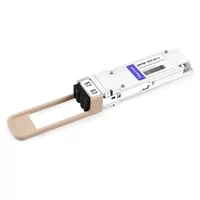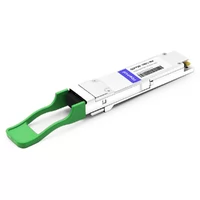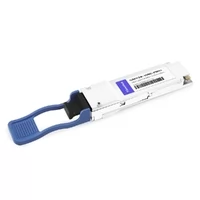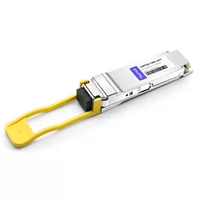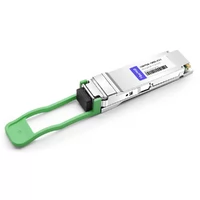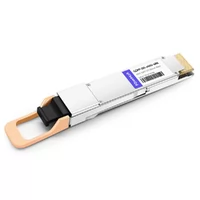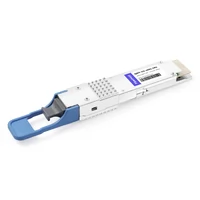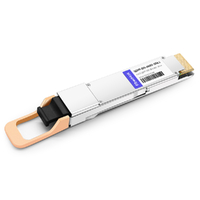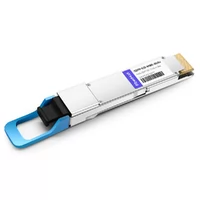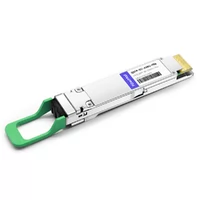In network architecture, a switch is an important device used to connect computers, servers, and other network devices. With the increasing needs of different fields, there are many types of switches. This article will detail the differences between data center switches and campus switches, including their principles and application scenarios.
Table of Contents
ToggleCampus switch
Campus switches are used in small network environments such as campuses and office buildings. They are mainly used to connect office equipment such as computers, phones, and printers.
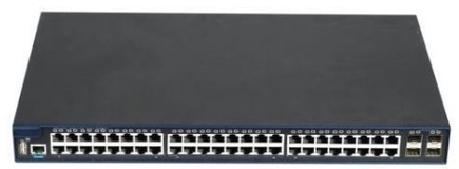
Campus switch
The following are the principles and application scenarios of campus switches:
Principles
Moderate performance and latency: Campus switches have relatively low performance and latency requirements because they are primarily used for connecting office equipment and general network communications. And they typically use Gigabit Ethernet (GbE) technology.
Moderate capacity and scalability: The number of ports on a campus switch is relatively small and generally adapts to the size of the campus or office building. They can meet the needs of connecting office equipment and extend as needed.
Reliability and redundancy: Campus switches typically have basic reliability and redundancy features to ensure continuity of the office network. This includes some basic failure recovery mechanisms such as link aggregation and redundant links.
Simplified network management: Campus switches typically feature simplified network management capabilities to reduce maintenance and configuration complexity. They provide basic network management functions such as port management, flow control and virtual LAN (VLAN) support.
Application scenarios
Campus switches are suitable for the following scenarios:
Office building network: Campus switches provide solutions for connecting office equipment and meet the basic needs of office building networks.
Small Enterprise network: For smaller enterprise networks, campus switches are an affordable choice that meets basic needs.
Educational and medical institutions: Campus switches are suitable for network connection needs in environments such as schools, universities, and hospitals.
Small business park: In business parks, campus switches provide network support for connecting office and store equipment.
Data center switch
Data center switches are designed for large data center environments. Data centers are used to store and manage a large number of computers and servers, process massive amounts of data, and provide high-performance computing and cloud services.
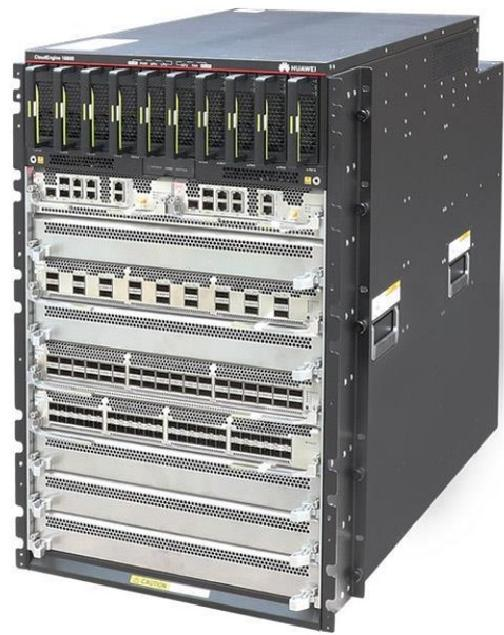
Data center switch
The following are the principles and application scenarios of data center switches:
Principles
High performance and low latency: Data center switches feature high-speed data transmission and low latency to meet the data center’s needs for high-performance computing and big data processing. They typically use high-speed Ethernet technologies such as Gigabit Ethernet (GbE)or 10 Gigabit Ethernet (10GbE).
Large capacity and scalability: Data center switches typically have a large number of ports and a highly scalable design to support connecting large numbers of servers and network devices. They can accommodate growing data center needs through stacking and module expansion.
High reliability and redundancy: Data center switches often include features such as redundant power supplies, redundant fans, and hot-swappable modules to provide high availability and fault recovery capabilities. This is because data center continuity is critical to the normal operations of the business.
Multi-level network management: Data center switches support advanced network management features such as virtual LAN (VLANs), load balancing, and flow control. These features enable better network segmentation and resource optimization, improving data center efficiency and manageability.
Application scenarios
Data center switches are suitable for the following scenarios:
Large data center: Data center switches can meet the high requirements for network performance and reliability such as high-performance computing, big data processing and cloud services.
Enterprise network: For large-scale enterprise networks, data center switches provide a scalable and highly flexible solution.
High load environment: In environments that need to handle large amounts of network traffic and complex network management, data center switches can provide high throughput and flow control functions.
The following table details the main differences between data center switches and campus switches:
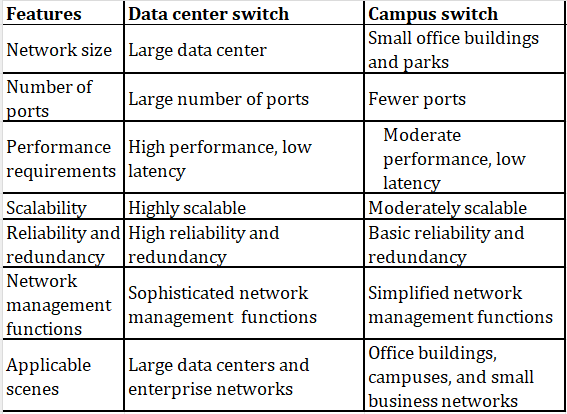
campus switch vs. data center switch
Below is a further explanation of each feature:
Network size: Data center switches are primarily used in large data center networks, while campus switches are suitable for small office buildings, campuses, or small enterprise networks.
Number of ports: Data center switches usually have a large number of ports to connect a great many servers and network devices, while campus switches have a relatively small number of ports to accommodate smaller network sizes.
Performance requirements: Data center switches have high performance and low latency requirements to meet the high-performance computing and big data processing needs of large-scale data centers, while campus switches have lower performance requirements.
Scalability: Data center switches are highly scalable and can be expanded according to the growth needs of the data center, while campus switches have relatively low scalability and are suitable for small network environments.
Reliability and redundancy: Data center switches have high reliability and redundancy, and usually have functions such as redundant power supplies, redundant fans, and hot-swappable modules to ensure the continuity of the data center network. Campus switches have basic reliability and redundancy capabilities.
Network management functions: Data center switches provide complex network management functions, such as virtual LAN (VLAN) division, traffic control, load balancing and other advanced functions to meet the complex network management needs of the data center. Campus switches provide simplified network management functions, including basic port management, basic VLAN support, etc., to meet the basic network needs of small office buildings and campuses.
Applicable scenes: Data center switches are suitable for large data center s and enterprise networks. It can meet the high requirements for network performance and reliability in high-performance computing, big data processing, and cloud services. Campus switches are suitable for smaller network environments such as office buildings, campuses, and small enterprise networks, and provide basic network connection and management functions.
Summary
There are obvious differences in principles and application scenarios between data center switches and campus switches. Data center switches are designed for large data center environments and feature high performance, large capacity and complex network management functions. Campus switches are suitable for small network environments and have moderate performance, capacity and simplified network management functions.
Related Products:
-
 QSFP28-100G-SR1.2 Single Rate 100G QSFP28 BIDI 850nm & 900nm 100m LC MMF DDM Optical Transceiver
$280.00
QSFP28-100G-SR1.2 Single Rate 100G QSFP28 BIDI 850nm & 900nm 100m LC MMF DDM Optical Transceiver
$280.00
-
 QSFP28-100G-IR4 100G QSFP28 IR4 1310nm (CWDM4) 2km LC SMF DDM Transceiver Module
$110.00
QSFP28-100G-IR4 100G QSFP28 IR4 1310nm (CWDM4) 2km LC SMF DDM Transceiver Module
$110.00
-
 QSFP28-100G-PSM4 100G QSFP28 PSM4 1310nm 500m MTP/MPO SMF DDM Transceiver Module
$180.00
QSFP28-100G-PSM4 100G QSFP28 PSM4 1310nm 500m MTP/MPO SMF DDM Transceiver Module
$180.00
-
 QSFP28-100G-DR1 100G QSFP28 Single Lambda DR 1310nm 500m LC SMF with FEC DDM Optical Transceiver
$180.00
QSFP28-100G-DR1 100G QSFP28 Single Lambda DR 1310nm 500m LC SMF with FEC DDM Optical Transceiver
$180.00
-
 QSFP28-100G-FR1 100G QSFP28 Single Lambda FR 1310nm 2km LC SMF with FEC DDM Optical Transceiver
$215.00
QSFP28-100G-FR1 100G QSFP28 Single Lambda FR 1310nm 2km LC SMF with FEC DDM Optical Transceiver
$215.00
-
 QSFP-DD-400G-SR8 400G QSFP-DD SR8 PAM4 850nm 100m MTP/MPO OM3 FEC Optical Transceiver Module
$149.00
QSFP-DD-400G-SR8 400G QSFP-DD SR8 PAM4 850nm 100m MTP/MPO OM3 FEC Optical Transceiver Module
$149.00
-
 QSFP-DD-400G-DR4 400G QSFP-DD DR4 PAM4 1310nm 500m MTP/MPO SMF FEC Optical Transceiver Module
$400.00
QSFP-DD-400G-DR4 400G QSFP-DD DR4 PAM4 1310nm 500m MTP/MPO SMF FEC Optical Transceiver Module
$400.00
-
 QSFP-DD-400G-SR4.2 400Gb/s QSFP-DD SR4 BiDi PAM4 850nm/910nm 100m/150m OM4/OM5 MMF MPO-12 FEC Optical Transceiver Module
$900.00
QSFP-DD-400G-SR4.2 400Gb/s QSFP-DD SR4 BiDi PAM4 850nm/910nm 100m/150m OM4/OM5 MMF MPO-12 FEC Optical Transceiver Module
$900.00
-
 QSFP-DD-400G-XDR4 400G QSFP-DD XDR4 PAM4 1310nm 2km MTP/MPO-12 SMF FEC Optical Transceiver Module
$580.00
QSFP-DD-400G-XDR4 400G QSFP-DD XDR4 PAM4 1310nm 2km MTP/MPO-12 SMF FEC Optical Transceiver Module
$580.00
-
 QSFP-DD-400G-FR4 400G QSFP-DD FR4 PAM4 CWDM4 2km LC SMF FEC Optical Transceiver Module
$500.00
QSFP-DD-400G-FR4 400G QSFP-DD FR4 PAM4 CWDM4 2km LC SMF FEC Optical Transceiver Module
$500.00

